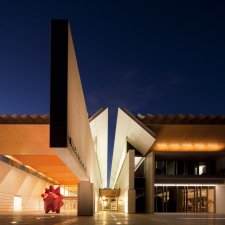- About us
- Support the Gallery
- Venue hire
- Publications
- Research library
- Organisation chart
- Employment
- Contact us
- Make a booking
- Onsite programs
- Online programs
- School visit information
- Learning resources
- Little Darlings
- Professional learning
Burnum Burnum (1936–1997) was a Woiworung/Yorta Yorta activist, actor and author. Born Harry Penrith at Wallaga Lake, New South Wales, he was taken from his family at three months old and spent his childhood in a mission home in Bomaderry and at the notorious Kinchela Boys' Home near Kempsey. After completing school he joined the public service, working in Sydney, Leeton and Wagga Wagga. In the mid-1960s he became involved in activism and sought to reconnect with his cultural heritage. He was involved in the establishment of the Aboriginal Tent Embassy in Canberra in 1972, and while studying law at the University of Tasmania he led a successful campaign to reclaim Trukanini's remains from the Tasmanian Museum and Art Gallery in Hobart. In 1976 he changed his name to Burnum Burnum (great warrior) to honour his great-grandfather, artist Tommy McRae, and the same year he was involved in the ceremonial dispersal of Trukanini’s ashes. On 26 January 1988, he laid claim to England at the White Cliffs of Dover, erecting the Aboriginal flag and offering the British a Koompartoo – a 'fresh start'. That year he wrote Burnum Burnum's Aboriginal Australia: A Traveller's Guide.
Purchased with funds provided by James Bain AM and Janette Bain 2010
© Bruce Postle



On one level The Companion talks about the most famous and frontline Australians, but on another it tells us about ourselves.



Visit us, learn with us, support us or work with us! Here’s a range of information about planning your visit, our history and more!



We depend on your support to keep creating our programs, exhibitions, publications and building the amazing portrait collection!